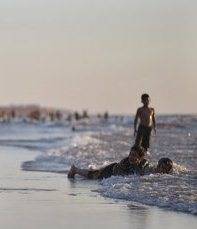The Gaza Strip will not be "liveable" by 2020 unless urgent action is taken to improve water supply, power, health, and schooling, according to the United Nations' most comprehensive report on the Palestinian territory.
"Action needs to be taken now if Gaza is to be a liveable place in 2020 and it is already difficult now," UN humanitarian coordinator Maxwell Gaylard told journalists when the report was released on Monday.
"The population of the Gaza Strip will increase from 1.6 million people today to 2.1 million people in 2020, resulting in a density of more than 5,800 people per square kilometer," a UN statement quoted the report as saying.
Infrastructure across a number of sectors - electricity, water and sanitation, and municipal and social services - is "not keeping pace with the needs of the growing population," it said.
The UN says only a quarter of Gaza waste water is treated. The rest, including raw sewage, goes into the Mediterranean Sea.
Even now the coastal strip, under an Israeli blockade of varying intensity since 2006, is suffering from its worst-ever fuel shortage and resultant power cuts, as well as from unemployment levels of around 45 per cent.
The UN said the demand for drinking water was projected to increase by 60 per cent over the next eight years, "while damage to the aquifer, the major water source, would become irreversible without remedial action now".
It added that more than 440 additional schools, 800 hospital beds and more than 1,000 doctors would be needed by 2020.
'Under blockade'
Israel first imposed a blockade on Gaza in June 2006 after fighters there kidnapped one of its soldiers, who was only freed last October in exchange for 1,027 Palestinian prisoners.
It was tightened a year later after the Hamas movement came to power, ousting forces loyal to the Western-backed Palestinian president Mahmoud Abbas.
The blockade has been eased somewhat but severe restrictions on movement remain in place.
The people in the narrow coastal strip live mainly on UN aid, foreign funding and a tunnel economy which brings in food, construction materials, electronics and cars from Egypt.
Gaylard called on international donors to increase their aid to a population which is 80 per cent aid dependent.
"Despite their best efforts the Palestinians in Gaza still need help," he said. "They are under blockade. They are under occupation and they need our help both politically and practically on the ground."
He said Gaza needs peace and security to improve the lives of its people. "It will certainly have to mean the end of blockade, the end of isolation and the end of conflict."
PHOTO CAPTION
Palestinian boys play on a beach in Gaza City on a summer's day August 26, 2012.
Source: Aljazeera.net


 Home
Home Discover Islam
Discover Islam Quran Recitations
Quran Recitations Lectures
Lectures
 Fatwa
Fatwa Articles
Articles Fiqh
Fiqh E-Books
E-Books Boys & Girls
Boys & Girls  Hajj Rulings
Hajj Rulings Hajj Fatwas
Hajj Fatwas














